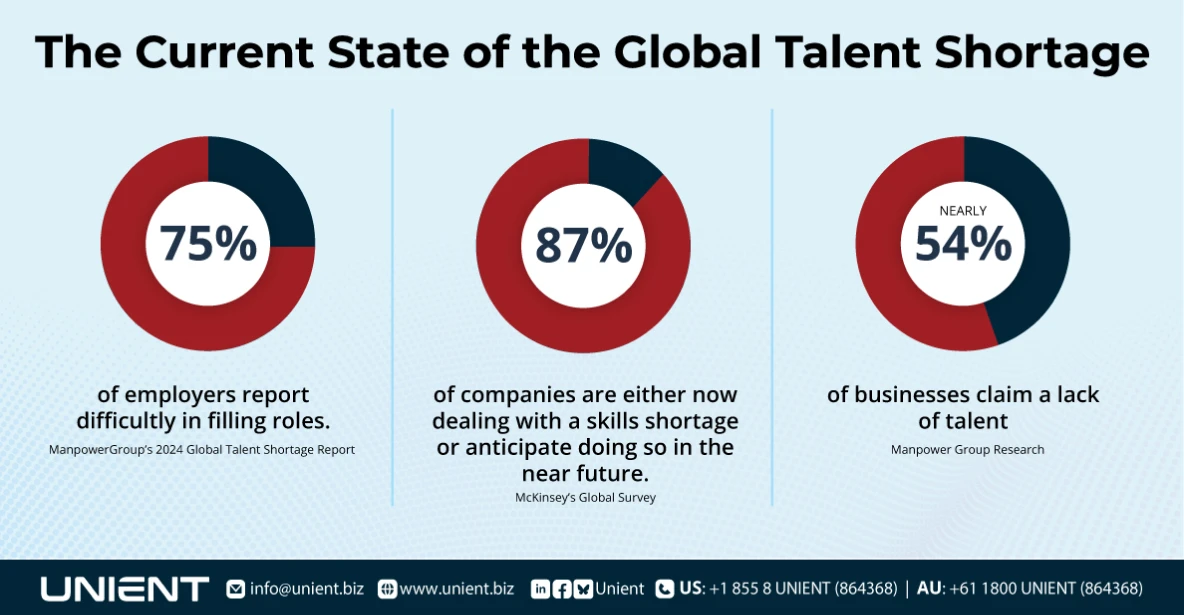Solving Talent Shortage: Why Businesses Need Offshore Staffing

The global talent shortage is like never before. Rapid technological developments, evolving business strategies, and shifting demographics have all combined to cause a serious scarcity of qualified workers in various industries, affecting companies of all sizes worldwide.
The shortage of skilled workers significantly challenges organisations' innovation and growth. This issue can also hinder project timelines, product quality, and creativity. Additionally, intense demand for top candidates often increases salaries and benefits to stay competitive, impacting profit.
Envision having access to a pool of qualified individuals eager to contribute to your business success while significantly lowering operating costs. By outsourcing your staff offshore, you not only save money due to advantageous labour costs but also tap into a resource-rich environment that will foster your company's growth and support its expansion.
The Current State of Talent Shortage
According to McKinsey's Global Surveys, 87% of companies are currently facing a skills shortage or expect to encounter one in the near future. This problem has doubled compared to previous decades. Additionally, nearly 54% of businesses report a lack of available talent.

Why is the global talent shortage such an urgent issue?
In fields like software development and information technology, advancements in technology are outpacing the availability of qualified labour. For example, emerging technologies such as blockchain, AI, and machine learning require specialised skills that current employees do not possess.
Furthermore, aging populations and younger generations' preference for more flexible work arrangements are affecting the workforce in developed nations.
All these things combined create a deficiency in talent that companies need to survive and thrive.
So, what can organisations like yours do? You can keep an advantage by incorporating into your corporate DNA the ability to manage changes and create ongoing approaches to talent planning. They should leverage this ecosystem, recognise the diverse skills and qualities employees offer beyond their formal roles, develop flexible teaming and deployment strategies, and fortify a culture that places a premium on adaptability to meet business needs to overcome this talent shortage. You can read further in this article by Gartner.
The Challenges Faced in Hiring Local Talents
The gap between the growing demand from businesses and the availability of skilled individuals is rising, causing a seismic instability in the global job market.
In most industries, with the digital revolution, this discrepancy is particularly noticeable. Languages and technologies are continuously being developed and changing daily. Additionally, not all applicants will have the necessary abilities, and there is little possibility that developers will be proficient in one area but deficient in another. This conundrum makes it challenging to hire someone without testing them. HR executives must invest a significant amount of time and money in this screening process.

Source: How companies are reskilling to address skill gaps | McKinsey
Noting the abilities that employers are most having trouble recruiting is also significant. Two of the most essential skills to success, communication and teamwork, are the most difficult to find soft skills among candidates. Following are responsibility and dependability, reasoning and problem-solving, active learning and curiosity, and resilience and adaptability.
For technical or "hard" skills, information technology and data, engineering, sales and marketing, operations and logistics, and manufacturing and production present the most security difficulties.
On top of all, the exact educational requirement is also an issue in talent shortages worldwide because they often exclude the majority of working-age adults with the experience and skills but not the precise degree required for the position.
And, it's near impossible not to credit the pandemic's effect with the disparities in supply and demand across various industries.
However, employers in sectors where the labour market conditions remain tight can effectively tackle skills shortages and give people looking to improve their employment prospects more opportunities by using a skills-based hiring approach rather than looking at academic credentials. Recent graduates can also benefit from this strategy, too, since it can provide them with better career opportunities.
Source: U.S. Census Bureau Releases New Educational Attainment Data
Why Do Businesses Consider Offshoring?
Offshoring refers to relocating a company's operations or services to a different country. It can involve transferring all or part of a business's operations and its workforce to another nation.
Because of numerous factors, the offshoring process can be challenging and complex, requiring thorough preparation and implementation. However, when done right, offshoring not only helps businesses with reducing expenses, accessing larger talent pools, and improving a business's competitiveness in the global market, but it also assists in providing better experiences for customers, streamlining operations, and other benefits.
Are you wondering if offshoring is the best move for you? Read this article about the five signs that mean it's time to offshore for your company.
And if you conclude that your next move is offshoring, having the right partner is your next step.
How Can You Find the Right Offshoring Partner?
With severe worldwide talent and skills shortages, the local workforce may not be enough to fill numerous companies' vacant roles. Nevertheless, untapped labour markets exist, such as in the Philippines and India.
To enter these markets, you must be adaptable and mobile. You must plan, evaluate, and analyse everything before committing to an offshore business partnership to reap the full benefits for your firm. Offshoring should be carried out in a way that benefits your company. The steps are as follows:
To learn more, read our complete guide to selecting the right offshoring partner for your business.
Unient: Your Source for the Best Offshore Talents

Image by rawpixel from Freepik: https://www.freepik.com/free-photo/corporate-business-handshake/.
The purposeful use of technology and human oversight offers an efficient way for businesses to maximise staff and achieve growth, despite the talent scarcity issues that industries around the world are facing.
Among 78 countries evaluated by Kearney's Global Services Index, India ranks first and the Philippines 12th as the most attractive offshore locations. Unient, being present in both countries, is in a good position to leverage the varied talent pool of both nations and helps the company maintain its success in the outsourcing and offshoring sector.
Because of their close cultural ties to Western markets, the Philippines and India are great choices for businesses wishing to grow internationally. But it's crucial to remember that offshoring isn't a universally applicable answer. To guarantee success, meticulous preparation and execution are necessary. Working with a reliable partner who can assist you in negotiating the particular difficulties of offshoring and leading you through the process is crucial.
If you want to make India and the Philippines your next talent hub, we at Unient can help you!
Our professional team can provide tailored solutions to meet your needs. To learn more about how we can assist you in achieving your staffing, outsourcing and offshoring objectives, schedule a call with us today.
 Australia
Australia India
India New Zealand
New Zealand Philippines
Philippines USA
USA